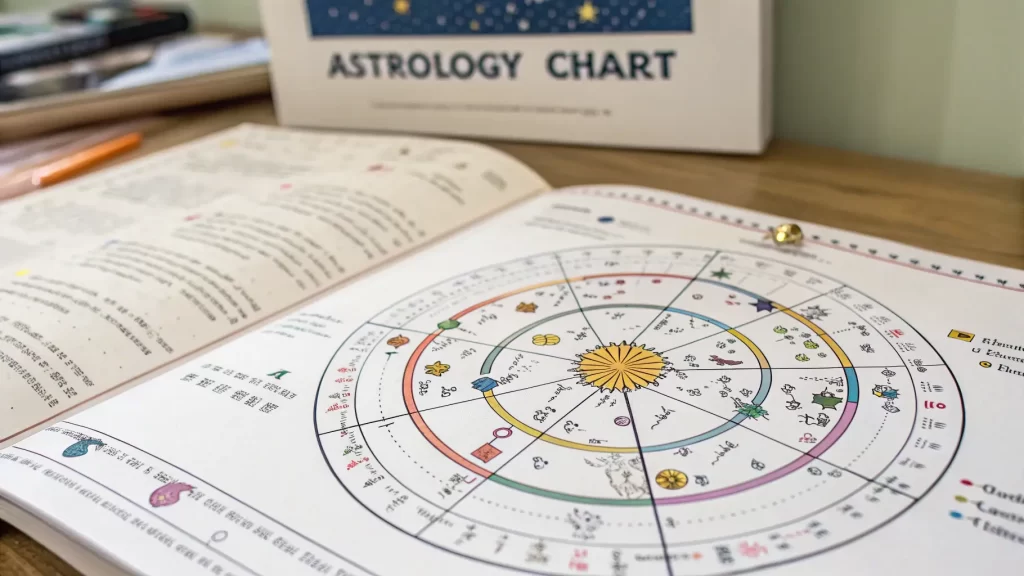- Key Takeaways:
- What Are Astrology Houses in a Birth Chart?
- How the 12 Houses in Astrology Are Divided and Ordered
- Overview of All 12 Astrology Houses and What They Represent
- The Meaning of Each Astrology House Explained
- 1st House – The House of Self
- 2nd House – The House of Value
- 3rd House – The House of Communication
- 4th House – The House of Home
- 5th House – The House of Pleasure
- 6th House – The House of Health and Service
- 7th House – The House of Partnerships
- 8th House – The House of Transformation
- 9th House – The House of Expansion
- 10th House – The House of Career
- 11th House – The House of Community
- 12th House – The House of the Unconscious
- How Planets in Astrology Houses Affect Interpretation
- Different House Systems: Placidus, Whole Sign, and Equal
- How to Find Your Natal Chart Houses (Step-by-Step Using DeluxeAstrology.com)
- Why Houses Matter More Than Just Your Sun Sign
- Conclusion: Your Chart Houses Reveal Your Life Blueprint
- FAQs About Astrology Houses
Most people who are into astrology know their sun sign. Maybe their moon or rising too. But there’s something else in your birth chart that quietly holds a lot more power than most realize—the houses.
Astrological houses, also called chart houses or natal chart houses, show you where different parts of your life play out. While signs show the style or vibe, the houses show the life area: your home, career, love life, family, money, health—it’s all there.
Imagine your chart as a circle split into twelve slices. Each slice is a house, and each one rules a different part of your life. These houses don’t change. What does change is where planets fall in your chart. That’s what makes your chart unique.
Astrology houses add depth, detail, and direction. They help you understand not just what’s going on, but where it will show up and why it matters. The moment you learn how to read them, astrology becomes much more personal and practical.
Key Takeaways:
Astrology houses show where life events unfold in your chart.
Each of the 12 houses rules a specific life area like career, love, health, or spirituality.
Your planets in houses change how and where energy shows up for you.
Understanding house placement adds power and clarity to your entire birth chart.
What Are Astrology Houses in a Birth Chart?

Astrology houses are 12 segments that divide your birth chart. Each house represents a different area of your life, from your identity to your dreams, your home to your career. They’re not random. They’re based on the time and location of your birth, which sets the rising sign and the placement of all twelve houses. The rising sign is determined by the zodiac sign on the eastern horizon at the time of birth.
In a natal chart, planets fall into different houses. Think of planets as the “what,” signs as the “how,” and houses as the “where.” For example, Mars is about action (what), Aries brings boldness (how), and the 7th house is about relationships (where). Put that together: bold action in relationships.
Understanding your chart houses helps you ground astrology in your real life. This is where the insights get specific and personal.
How the 12 Houses in Astrology Are Divided and Ordered
Where It All Begins: The Ascendant and House Flow
Your 1st house starts at the Ascendant, also known as your rising sign. The first house begins at the exact degree of the zodiac sign where the ascendant falls. From there, the 12 houses move counterclockwise around the birth chart. Each house focuses on a different part of life—your identity, home, relationships, career, and more.
The Four Quadrants: Life in Stages
The 12 houses are grouped into four sets of three. Each group represents a different life phase:
Houses 1–3 reflect your personal self and early development.
Houses 4–6 focus on your private world, daily routines, and self-care.
Houses 7–9 are about relationships, growth, and how you connect with others. The eighth house governs themes of transformation, intimacy, and shared resources.
Houses 10–12 explore your public life, legacy, and spiritual purpose.
The House Modalities: Action, Stability, and Change
Astrology also divides the houses by how energy moves through them:
Angular houses (1st, 4th, 7th, 10th) are points of strong action and visibility.
Succedent houses (2nd, 5th, 8th, 11th) bring stability and support. The eleventh house focuses on friendships, social networks, and future aspirations.
Cadent houses (3rd, 6th, 9th, 12th) bring learning, flexibility, and reflection.
The Zodiac Rulers: Natural House Order
Each house is naturally ruled by a zodiac sign, starting with Aries for the 1st house and ending with Pisces for the 12th. This gives the chart a natural flow—from fiery beginnings to spiritual completion.
Understanding this structure helps you read any birth chart with more clarity. It shows not just what’s happening—but where in your life it’s unfolding.
Overview of All 12 Astrology Houses and What They Represent
Here’s a quick snapshot of what each house rules:
1st House: Self, appearance, identity, how you begin things
2nd House: Money, values, possessions, self-worth
3rd House: Communication, learning, siblings, thinking style
4th House: Home, family, roots, emotional foundation
5th House: Creativity, romance, children, self-expression
6th House: Health, work, routines, service, discipline
7th House: Relationships, marriage, partnerships
8th House: Transformation, intimacy, shared resources, rebirth
9th House: Travel, higher education, beliefs, expansion
10th House: Career, public image, authority, reputation
11th House: Friends, community, vision, goals
12th House: Spirituality, dreams, hidden patterns, isolation
Each of these houses gives context to the planets that land inside them in your chart. You’ll understand not just what you’re experiencing—but where and why.
The Meaning of Each Astrology House Explained
1st House – The House of Self
The first house is the house of you. It begins at your rising sign and shapes how others first see you—your appearance, body language, and overall vibe. It also influences how you tackle new situations, how confident you feel in your skin, and how you move through the world. If planets land here, they become a core part of your identity.
2nd House – The House of Value
The second house speaks to money, self-worth, and what makes you feel safe and stable. It’s about how you earn, save, and spend—but also how much you value yourself. This house answers: What do I need to feel secure? What do I truly value in life? It also shows your relationship with abundance and your sense of personal power.
3rd House – The House of Communication
The third house governs your mind and how you express your thoughts—through speaking, writing, or teaching. It also covers siblings, neighbors, early school years, and everyday interactions. A strong 3rd house often means you’re curious, talkative, or deeply analytical. It’s how you connect with your local world.
4th House – The House of Home
Your emotional roots live here. The fourth house reflects your family history, private life, and sense of home—both the one you grew up in and the one you create as an adult. It reveals how you nurture, how you receive care, and what makes you feel truly at peace. It’s often tied to your mother or primary caregiver.
5th House – The House of Pleasure
The fifth house is where your heart lives. It’s about fun, passion, dating, hobbies, and anything that makes you feel alive and expressive. It also rules children—either your own or your inner child. This house encourages you to take creative risks, enjoy romance, and live with more joy.
6th House – The House of Health and Service
The sixth house rules your daily life: your job, health habits, routines, and your sense of duty. It’s not about grand career goals but how you function day-to-day. Do you thrive on structure? Do you overgive? It also shows how you care for your physical body and the balance between work and wellness.
7th House – The House of Partnerships
The seventh house is the house of committed relationships—marriage, business partners, contracts, and serious one-on-one connections. It reflects how you relate to others, what you seek in a partner, and how you show up in close bonds. It also mirrors parts of yourself that you often project onto others.
8th House – The House of Transformation
The eighth house is the deep dive. It rules shared money, sex, intimacy, emotional vulnerability, and rebirth. It often shows how you handle trust, loss, and change. It’s also connected to spiritual awakening and energetic exchange—what you give, what you receive, and what you’re willing to shed to grow.
9th House – The House of Expansion
The ninth house is your big-picture house. It’s about travel, learning, belief systems, and what gives your life meaning. If the 3rd house is your neighborhood, the 9th is the world. It pushes you to grow mentally, spiritually, and culturally. It also shows your relationship with faith, teaching, and lifelong learning.
10th House – The House of Career
The tenth house rules your public image, career, and life legacy. It’s how the world sees you—and what you aim to accomplish long-term. This is your “what do I want to be known for?” house. It can also reflect your relationship with authority, status, and your father or father figure.
11th House – The House of Community
The eleventh house shows your social world—friendships, networking, group causes, and your future vision. It’s about how you connect with people who share your values and how you contribute to something bigger than yourself. This is where your hopes and humanitarian spirit come alive.
12th House – The House of the Unconscious
The twelfth house is the hidden realm. It holds your dreams, fears, subconscious patterns, past-life energy, and spiritual connection. It’s tied to solitude, retreat, and sometimes self-sabotage. But it also brings intuition, healing, and quiet strength. If you have planets here, they often work behind the scenes but carry deep spiritual weight.
How Planets in Astrology Houses Affect Interpretation
Planets bring the energy. Houses show where that energy plays out. When you place a planet inside a house, you get a clear sense of how that part of your life is influenced.
For example, if your Sun is in the 1st house, your identity, confidence, and presence are front and center. You naturally take the lead. If your Moon is in the 4th house, your emotional world is deeply tied to home, family, and your roots. You may crave privacy, comfort, and a solid emotional base.
This is why no two people with the same Sun sign live the same life. The house placement makes all the difference. A Mars in the 10th house may push you toward ambitious career goals, while Mars in the 6th might drive your daily work and routines instead.
Houses give planets direction—adding focus to their energy and helping you understand which parts of life they influence the most.
Different House Systems: Placidus, Whole Sign, and Equal
Not all birth charts are created using the same method. Astrology has several house systems, and each one maps the houses a little differently. The three most common systems are Placidus, Whole Sign, and Equal House.
Placidus is widely used in modern Western astrology. It divides the houses based on time and space, which can make house sizes vary. Some houses will be bigger or smaller depending on your birth location.
Whole Sign is simpler. It assigns one full zodiac sign to each house, starting with your rising sign. This system is popular in traditional and Hellenistic astrology. It creates even spacing but can move planets into different houses than you’d see in Placidus. The whole sign house system is one of the oldest methods of house division, historically significant in Hellenistic and Indian astrology.
Equal House also divides the chart into 12 equal slices, but it starts from the exact degree of your rising sign—not just the sign itself. It balances house size but still keeps that personal degree as the starting point. The sign house system structures houses based on zodiac signs, contrasting with other systems like equal houses.
So which one is best? It depends. Each system offers a slightly different lens. Some people resonate more with one than the others. The key is to explore and see which interpretation feels most true for your personal experience. There’s no one-size-fits-all here—only what brings you the most insight.
How to Find Your Natal Chart Houses (Step-by-Step Using DeluxeAstrology.com)
If you want to understand your astrology houses, the easiest way is through a free chart calculator. Here’s how to do it using DeluxeAstrology.com.
Step 1: Get Your Birth Info Ready
You’ll need your birth date, exact time, and the city you were born in. The time is especially important—it sets your rising sign, which affects every house in your chart.
Step 2: Visit the Calculator
Go to DeluxeAstrology.com. The birth chart calculator is free, easy to use, and works instantly.
Step 3: Fill in Your Details
Type in your name (optional), date of birth, time of birth, and location. Make sure everything is accurate before clicking “Calculate My Chart.”
Step 4: View Your Chart
In seconds, your full natal chart will appear. It shows your rising sign and which zodiac signs rule each of the 12 houses. You’ll also see where each planet lands in your chart.
Step 5: Read Your House Placements
You’ll find a list of your planets and their house placements—like Sun in the 5th house or Moon in the 11th. This tells you which parts of life each planet influences for you.
Why Houses Matter More Than Just Your Sun Sign
Most people know their Sun sign, and maybe they read daily horoscopes based on it. But here’s the truth—your astrology houses reveal much more about your actual life. While signs show your personality, houses show where those traits show up.
Signs Show How, Houses Show Where
Think of it like this: zodiac signs describe the style or energy behind your actions, while houses show what area of life that energy touches.
Let’s say your Sun is in Cancer. That means you’re nurturing, sensitive, and family-oriented. But if that Sun falls in your 10th house, all that emotional strength may be focused on your career. You might lead from the heart, nurture teams, or build a legacy that feels like home.
Now imagine the same Cancer Sun in the 4th house. That’s someone who pours their energy into family life or emotional security instead of public ambition.
Your Sun Sign Isn’t the Whole Story
This is why two people with the same zodiac sign can live completely different lives. It all depends on where the planets fall in their houses. Your chart house placements show whether your energy is playing out in relationships, work, travel, health, or something deeper.
Why You Should Go Beyond Horoscopes
Relying only on your Sun sign to understand yourself is like judging a book by its cover. The real insights come from your full birth chart—and especially your houses. They bring clarity to what matters most, what drives you, and where you’re meant to grow.
Conclusion: Your Chart Houses Reveal Your Life Blueprint
Understanding your astrology houses gives you more than insight—it gives you direction. These twelve segments show you where your energy flows, where challenges arise, and where your soul seeks growth.
Your zodiac sign may describe your personality, but your chart houses show your purpose. They offer a clear map of who you are, where you’ve been, and where you’re going.
Want to explore your chart houses in depth? Use our Free Natal Chart Calculator or check your Life Path Number for more personalized guidance.
The stars may hint at your path—but your houses tell the story.
FAQs About Astrology Houses
What is a chart house in astrology?
A chart house is one of the twelve sections of your birth chart. Each house rules a specific part of life.
What does it mean if a house is empty?
It doesn’t mean that part of your life is empty. It just means it’s not a key focus. Look at the ruling sign and planet to understand it better.
Which house shows love and relationships?
The 5th house rules romance and the 7th house rules committed partnerships.
How do I find my most important house?
Look where your Sun, Moon, and rising sign are. Also check which house has the most planets.
Are astrology houses more important than signs?
They’re equally important. Signs describe how energy works. Houses describe where it shows up.


